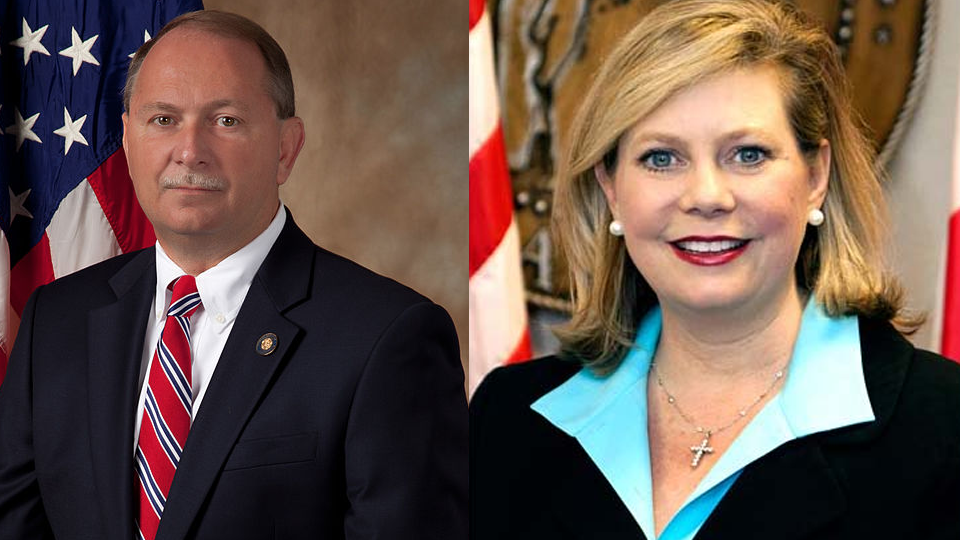Terry Dunn qualifies in Alabama PSC race against President Twinkle Cavanaugh

Former Public Service Commission member Terry Dunn made good on his vow to run against Commission President Twinkle Andress Cavanaugh as qualifying ends Friday at 5 p.m. The 11th-hour move was confirmed by the Alabama Republican Party’s Reed Phillips by phone Friday afternoon. The former commissioner has been called a “closet liberal in league with environmentalists” from some quarters, and is likely to be opposed heavily by state-backed utilities like Alabama Power. Dunn has filed to challenge Cavanaugh, first elected in 2010, in the state’s Republican primary elections. It was reported as recently as Wednesday that no one would challenge Cavanaugh. Dunn originally filed for the race in August, but then dropped out on October 26 citing concerns that the utilities would spend “a lot of money” to defeat his bid to return to the commission. During his time on the commission, Dunn received political pushback for advocating formal rate hearings for Alabama Power, something opposed by fellow commissioners Cavanaugh and Jeremy Oden. Dunn echoed the call of environmental groups and the AARP in that effort, which opponents feared would create a “judicial setting” requiring all testifiers to retain attorneys. In lieu, several informal hearings were held throughout the state in 2013. Dunn’s chief of staff David Roundtree has also been criticized among conservatives for perceived stances against the coal industry, which employs thousands of Alabamians. The pro-coal group Coal Jobs Count released a video back in April lumping in Dunn with President Barack Obama, an exceedingly unpopular figure in Alabama. The video features coal miner John Box telling Dunn, “If you really care about jobs, get out of the way,” in response to a bill proposed by Dunn to ban commissioners from accepting contributions from the industry. The primaries are set for March 1, 2016 as part of Alabama’s new alignment with the so-called “SEC primary,” by which a new bloc of Southern states is banding together to increase their importance in national elections. The following post was made by Dunn on his personal Facebook page yesterday, foreshadowing a run: Dunn could not be contacted for comment at press time.
Public Service Commission approves new small business incentives

At the October meeting of the Alabama Public Service Commission, the 3-member regulatory panel gave the green light to a pair of new incentives for small businesses meant to encourage commercial expansion into underserved areas. One incentive called the Community Redevelopment Incentive or “CRI,” gives businesses a discount on their energy bill for up to one year in exchange for an agreement to activate an Alabama Power electricity account in a building that has gone unoccupied for at least six months. The other initiative, called the Economic Development Incentive or “EDI,” provides two year’s worth of incentives for customers “meeting criteria related to additional incremental load,” meaning substantially increasing their levels of consumption, presumably by way of renovation or expansion. “Because these incentives will increase the number of Alabama Power customers,” said the office of the PSC in a news release Tuesday afternoon, “they will also put downward pressure on the rates of all customers.” PSC President Twinkle Andress Cavanaugh, a former Republican party leader who served as the state GOP’s first female Chairman, said the twin moves by the regulatory body are in keeping with its conservative direction. “Alabamians can rest assured that I will continue to do what I have done throughout my tenure at the Public Service Commission – fight for you and against the federal government’s relentless assault on our economy,” said Cavanaugh. “President Reagan was right when he said, ‘Government is not the solution to our problem; government is the problem.’” The PSC’s other two commissioners echoed her remarks, though less pointedly, in accompanying statements Tuesday afternoon following the commission’s unanimous vote. “Small Business is a cornerstone to the American dream,” said Commissioner Jeremy Oden, who was appointed to the PSC by Gov. Robert Bentley. “One of my top priorities has always been to protect and promote small business and help provide every man or woman with the opportunity to achieve that dream. I was proud to vote today for incentives that will assist small business in today’s political climate.” Commissioner Chris “Chip” Beeker, Jr. concurred with his fellow regulators. “The two incentives we approved today will benefit small business owners who take the risks necessary for job creation and retention,” said Beeker. “I am hopeful that our actions will work to counter the federal regulations that increasingly punish those individuals who serve as the backbone of our economy.” All three commissioners are statewide elected officials who were elected on the Republican ticket. The announcement proclaiming the new incentive deals came with introductory barbs pointed at contemporary energy policies prevailing among federal officials and regulators. “Sadly, the greatest challenges facing small businesses are the overly-burdensome governmental red tape and mandates coming from Washington, DC,” read the announcement. “The PSC Commissioners recognize that, in today’s economy, government should not hamstring business owners but, rather, should remove the obstacles they face and make their job of creating jobs easier. Unlike the federal government, the Commissioners intend to help the economy, not hurt it.”
Alabama Power seeking up to 500 megawatts of renewable generation, including solar

Alabama Power aims to boost its renewable power options in a move that could allow the company to offer more solar power than it has ever offered before. The company said, in response to growing customer interest, it is seeking approval for up to 500 megawatts of generation from renewable resources, including solar. In June, Alabama Power filed a petition with the Alabama Public Service Commission (PSC) to allow the company to pursue a variety of projects up to 80 megawatts each, totaling up to 500 megawatts over a six-year period. The company has identified solar as one of the areas for potential growth in renewables. “This proposal provides a common-sense path for expanding renewables in Alabama,” said Nick Sellers, Alabama Power vice president of regulatory and corporate affairs. “The Public Service Commission has been clear that they do not want renewables to be subsidized by all of our customers. This filing achieves that policy directive while also allowing for solar and new renewable energy projects that are expected to provide economic benefit for all of our customers.” If approved, the plan would allow Alabama Power to build its own renewable projects or purchase power from other renewable-generated sources. Sellers said 500 megawatts is between four percent and five percent of the company’s capacity. The company said it is prepared to move forward working with interested customers on projects upon receipt of PSC approval. “This program was driven by conversations with customers looking to meet renewable mandates pushed down from their headquarters,” said Tony Smoke, Alabama Power vice president of marketing. “Our field representatives have worked hard to identify customers who could be impacted and if this is approved, we will go directly to work with them to explore options.” As an example, 500 megawatts of solar power is enough renewable energy to serve about 100,000 homes during an hour of peak sun intensity on cloudless days. Alabama Power already has 1,600 megawatts of hydro resources across Alabama, and 404 megawatts of wind generation from projects in Kansas and Oklahoma. Alabama Power has the ability to resell this energy, or the associated renewable energy credits, to third parties to help keep rates low for customers. As more customers wanted solar within the mix of renewable options, Alabama Power has been exploring the best ways to meet that demand without adversely impacting existing customers. “The renewable generation program would provide broad options for us to work with customers willing to pay for renewable costs, while allowing us to protect other customers from bearing additional costs,” Smoke said. “As a service provider, our focus is to make sure we are providing customers access to choices they want,” Smoke added. “Through this plan, we are creating new customer options to sustain and grow industry in our state.” Sellers said the demand for the renewable mix and the costs of providing it are at a point now where Alabama Power can do so without impacting what other customers pay for electricity. “We’ve got customer interest in renewables, and particularly in solar right now. We want to make sure we have that offering available to those customers who are interested at looking at more renewables in the state,” he said. “We’ve seen a growing trend for more renewables and particularly for solar from some of our customers. It’s usually those customers that are under some sort of a mandate, either a government mandate or a corporate mandate.” The company is no stranger to renewable energy. “Our company was founded on renewable energy – hydroelectricity,” Sellers said. “As you know, we’ve got a significant amount of wind generation in our portfolio and now this gives us an opportunity to add solar to that renewable generation mix as well.” Solar energy could grow along with other forms of renewable energy as long as they don’t unfairly burden customers, Sellers said. Republished with permission of Alabama Newscenter Michael Tomberlin is the Editor of Alabama Newscenter, a senior communications specialist with Alabama Power, and an artillery officer in the Alabama National Guard.


